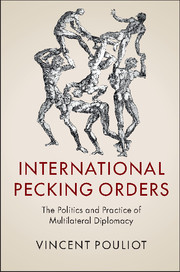Book contents
- Frontmatter
- Contents
- List of figures
- List of tables
- Preface and acknowledgments
- List of abbreviations
- Introduction: All the world's a stage
- Part I Situations
- Part II Dispositions
- Part III Relations
- Part IV Positions
- 7 State practices and multilateral fields
- 8 The field logics of multilateral pecking orders: NATO and the UN compared
- Conclusion: The “miracle” of multilateral pecking orders
- Appendix: Research design, methods and data
- References
- Index
8 - The field logics of multilateral pecking orders: NATO and the UN compared
from Part IV - Positions
Published online by Cambridge University Press: 05 March 2016
- Frontmatter
- Contents
- List of figures
- List of tables
- Preface and acknowledgments
- List of abbreviations
- Introduction: All the world's a stage
- Part I Situations
- Part II Dispositions
- Part III Relations
- Part IV Positions
- 7 State practices and multilateral fields
- 8 The field logics of multilateral pecking orders: NATO and the UN compared
- Conclusion: The “miracle” of multilateral pecking orders
- Appendix: Research design, methods and data
- References
- Index
Summary
What are the field logics of the NATO and UN pecking orders? Put differently, how do the positions that countries occupy in various social distributions (thanks to multilateral practices) associate with their standing within the organization? Starting from the premise that each field rewards particular kinds of state practices and markers of standing, I argue that certain ways of doing things associate more closely with pecking order dynamics than others. This chapter makes use of multiple correspondence analysis (MCA) in order to understand these positional dynamics at the macro-level. What kind of statistical relations are there between the ways in which capitals channel their assets to IO headquarters and position themselves, on the one hand, and the local hierarchy of standing, on the other?
The chapter unfolds into two main sections. I begin with a discussion of the basic principles of MCA and provide a few guidelines to help interpretation of the figures that it generates. Turning to the empirical analysis itself, I then look into the main structuring principles that organize the NATO and the UN multilateral fields. Some distributions are much more closely related to the local pecking order than others. My next step is to look into what may be called “positional anomalies,” that is to say, social forces whose distributions do not follow the hierarchy of standing in a purely positional logic. I show that functional contributions produce intriguing practical logics of emancipation and compensation; that country experience connects with pecking order more than any other variables; and that position-takings associate remarkably strongly with social stratification, suggesting that hierarchies of standing have a strong epistemic dimension. I conclude the chapter with a comparative discussion of the NATO and UN field logics, which points to both similarities and differences in the operation of multilateral pecking orders. While each organization has its own set of organizing principles, overall the connections with broader systemic patterns are worth noticing.
Multiple correspondence analysis
The purpose of this section is to accompany the reader in the interpretation of the MCA analysis presented in this chapter. Going through the next few pages is not an absolute necessity in order to make sense of my empirical analysis. Although I tried my best to reduce the technical complexity of what follows to a strict minimum, some elementary understanding of statistics may be required.
- Type
- Chapter
- Information
- International Pecking OrdersThe Politics and Practice of Multilateral Diplomacy, pp. 226 - 253Publisher: Cambridge University PressPrint publication year: 2016



